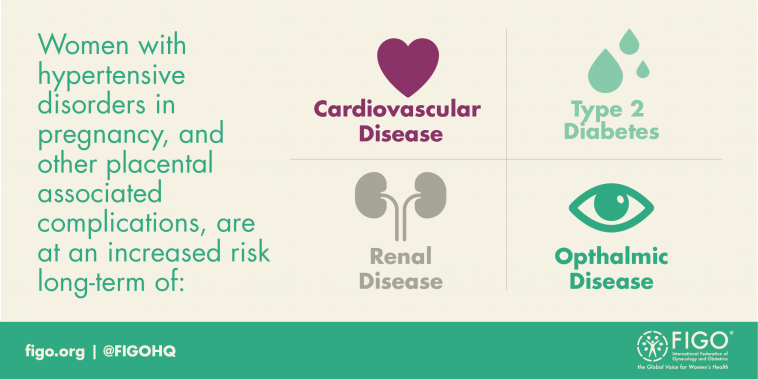Link between Maternal health and NCDs

Women who suffer from gestational diabetes, pre-eclampsia, hypertension or placental complications are at a substantially greater risk of developing long-term non-communicable diseases (NCDs), such as cardiovascular disease or Type 2 diabetes.
Today, FIGO has released a new supplement in the International Journal Gynecology and Obstetrics (IJGO) focusing on the critical importance of postpartum follow-up care for women who have faced complications during pregnancy.
Professor Moshe Hod, Chair of FIGO’s Pregnancy and Non-Communicable Diseases Committee highlights:
“Pregnancy is a window of opportunity. Caregivers and women need to be made aware of the risks of cardiovascular disease, and the remarkable opportunity to modulate those risks through preventive lifestyle interventions. We should strive for all women with risk factors such as gestational diabetes, obesity and pregnancy hypertension to be offered post-pregnancy counselling and regular follow-up at a general practitioner starting at 3 months postpartum.”
It is clear that gestational diabetes mellitus (GDM) is not merely an issue during pregnancy: women with GDM are at increased risk of Type 2 diabetes mellitus and for long-term cardiovascular morbidity. There is a 7-fold higher likelihood of Type 2 diabetes mellitus within 10 years of a pregnancy complicated with GDM. Likewise, pre-eclampsia and gestational hypertension are associated with a 6x increase in risk of hypertension within a 10-year period after giving birth. These women are at a significant risk of long-term cardiovascular and cerebrovascular diseases. Women who deliver preterm are at a greater risk of developing cardiovascular disease.
The new FIGO guidelines provide a much-needed set of recommendations for good practice.
Risk modifications should be discussed as part of patient education, including nutrition and physical activity, treatment for obesity and overweight, controlling blood pressure, and smoking cessation.
The recommendations include the identification of ‘at-risk’ women (who have suffered a complication during pregnancy) should have a postpartum follow-up at 6–12 weeks and periodically thereafter, which includes:
- taking a full history
- undertaking a physical examination
- taking blood pressure measurements
- screening for diabetes or cardiovascular risk factors as appropriate
- follow-up periodically over the long term to ensure that these ‘at-risk’ women are provided with preventive care and guidance
FIGO wants to highlight the importance of long-term monitoring of these women in order to mitigate the risks of developing cardiovascular disease and other NCDs later in their lives.
The new guidelines are FIGO's attempt to highlight the critical link between maternal health and the rising tide of NCDs as well as focusing on the need for integrated action to address women's health and SDG 3.4.
